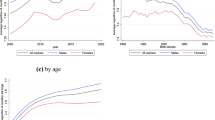Abstract
This paper explores trends in retirement income inequality in Canada from 1991 to 2011. Although poverty rates among retired Canadian seniors have mostly stabilized, our research suggests that since the 1990s other measures of income inequality have sharply risen. Using census microdata files (1991–2011) and national-level Canadian statistics, we explore the dynamics of income inequality for Canadian retirees by examining relative income from both private and public sources. We find that levels of private retirement income have dramatically risen for some, thus changing the landscape of income inequality for Canadian seniors. Although Canada’s pension system has remained relatively stable, policy drift and layering (Hacker 2004) have occurred, leading to heightened inequality over time. We argue that public policy offers incomplete protection against new inequalities and social risks now associated with retirement.





Similar content being viewed by others
Notes
The age and labour force status refer to the reference week of the census in May for each Statistics Canada census period. However, income for each census refers to the previous year of income. To ensure an unbiased sample, we have removed all individuals in our sample who reported a market income, but also retirement status.
Following Brochu et al. 2014, we must also note that the collection of income by Statistics Canada has changed over time and may have affected the representation of incomes from those in lower socioeconomic positions.
These raw data were extracted from Statistics Canada CANSIM series.
Supplementary analysis confirmed that this group was disproportionately made of newer Canadian immigrants.
References
Baldwin, B. (2009). Research Study on the Canadian Retirement Income System: Prepared for the Ministry of Finance, Government of Ontario. Retrieved from http://www.fin.gov.on.ca/en/consultations/pension/dec09report.pdf.
Banting, K., & Myles, J. (2013). Inequality and the Fading of Redistributive Politics. Vancouver: UBC Press.
Bonoli, G., Taylor-Gooby, P., & George, V. (2000). European Welfare Futures: Towards a Theory of Retrenchment. Cambridge: Polity Press.
Brown, R. (2011). Economic Security in an Aging Canadian Population. Canadian Journal on Aging, 30(3), 391–399.
Curtis, J & Lightman N. (2017). Golden Years or Retirement Fears? Private Pension Inequality Among Canada’s Immigrants. Canadian Journal on Aging, 36(2):178–195.
Curtis, J, Weizhen D, Lightman, N, & Parbst, M. (2017). Race, Language, or Length of Residency? Explaining Unequal Uptake of Government Pensions in Canada. Journal of Aging & Social Policy, 29,(4):332–351.
Government of Canada. (2015). Guaranteed Income Supplement - Overview. Retrieved April 8, 2016, from http://www.esdc.gc.ca/en/cpp/oas/gis/index.page.
Hacker, J. S. (2004). Privatizing risk without privatizing the welfare state: The hidden politics of social policy retrenchment in the United States. American Political Science Review, 98(02), 243–260.
Huber, E., & Stephens, J. D. (2001). Globalization, Competitiveness, and the Social Democratic Model. Social Policy and Society, 1(1), 47–57.
LaRochelle-Cote, S., Myles, J., Picot, G. (2008). Replacing Family Income During the Retirement Years: How are Canadians Doing? Retrieved from Statistics Canada.
Mahon, R. (2013). Childcare, New Social Risks, and the New Politics of Redistribution in Ontario. In K. Banting & J. Myles (Eds.), Inequality and the Fading of Redistributive Politics (pp. 359–380). Vancouver: UBS Press.
Milligan, K. (2008). The Evolution of Elderly Poverty in Canada. Canadian Public Policy, 34(4), S79–S94.
Milligan, K. (2015). Incomes and Hardship in Early Transitions to Retirement. Canadian Journal on Aging, 34(1), 1–13.
Myles, J., & Pierson, P. (2001). The Comparative Political Economy of Pension Reform. In P. Person (Ed.), The New Politics of the Welfare State (pp. 305–333). Oxford: Oxford University Press.
Myles, J. (2000a). The Maturation of Canada’s Retirment Income System: Income Lev els, Income Inequality and Low Income among the Elderly. Canadian Journal on Aging, 19(3), 287–316.
Myles, J. (2000b). Incomes of seniors. Retrieved from http://www.statcan.gc.ca/pub/75-001-x/2000004/5413-eng.pdf.
Myles, J. (2013). Income Security for Seniors: System Maintenance and Policy Drift. In K. Banting & J. Myles (Eds.), Inequality and the Fading of Redistributive Politics (pp. 312–334). Vancouver: UBS Press.
Osberg, L. (2001). Poverty Among Senior Citizens: A Canadian Success Story. In P. Grady & A. Sharpe (Eds.), The State of Economic in Canada: Festschrift in Houour of David Slater. Center for the Study of Living Standards and John Deutsch Institute: Ottawa.
Pierson, P. (1994). Dismantling the Welfare State? Reagan, Thatcher and the Politics of Retrenchment. Cambridge: Cambridge University Press.
Pierson, P. (1996). The New Politics of the Welfare State. World Politics, 48(2), 143–179.
Pierson, P. (2001). The New Politics of the Welfare State. Oxford: Oxford University Press.
Pierson, P. (2004). Politics in Time: History, Institutions, and Social Analysis. New Jersey: Princeton University Press.
Schirle, T. (2009). Income Inequality among Seniors in Canada: The Role of Women's Labour Market Experience. CLSRN Working Papers: clsrn-admin-2009-68. (December). Vancouver: University of British Columbia, Department of Economics.
Schirle, T. (2013). Senior poverty in Canada: a decomposition analysis. Canadian Public Policy, 39(4), 517–540.
Task Force on Retirement Income Policy, 1979 (1980). The Retirement Income System in Canada: Problems and Alternative Policies for Reform. Hull: Supply and Services Canada.
Veall, M. R. (2008). Canadian seniors and the low income measure. Canadian Public Policy, 34(4), S47–S58.
World Bank. (1994). Averting the old age crisis. New York: Oxford University Press.
Author information
Authors and Affiliations
Corresponding author
Rights and permissions
About this article
Cite this article
Curtis, J., McMullin, J. Dynamics of Retirement Income Inequality in Canada, 1991-2011. Population Ageing 12, 51–68 (2019). https://doi.org/10.1007/s12062-018-9219-5
Received:
Accepted:
Published:
Issue Date:
DOI: https://doi.org/10.1007/s12062-018-9219-5




